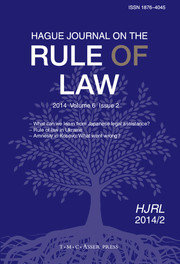Article contents
From ‘Which Rule of Law?’ to ‘The Ruleof Which Law?’: Post-Communist Experiences of European LegalIntegration
Published online by Cambridge University Press: 28 September 2009
Abstract
In the last two decades, post-communist states experienced a fascinatingpolitical journey, from using the rule of law concept in the most general way asan early signal of the coming constitutional and political transformation, tospecifically (as EU Member States) addressing the problem of the supremacy of EUlaw and its effect on emerging national democracy and constitutionalsovereignty. In other words, they moved from asking the question‘which rule of law?’ to the question ‘the rule ofwhich law?’
This move itself indicates the capacity of the rule of law, which is discussed inthis article, to operate as a political ideal and a power technique at the sametime. This duality of the rule of law operations will be outlined against thebackground of the process of European integration and its challenges to thetraditional constitutional notions of sovereignty and legal unity. I shall arguethat post-communist states initially had to embrace the substantive concept ofthe rule of law drawing on liberal and democratic values, which became a validticket for ‘The Return to Europe’ journey. However, the veryprocess of European integration involved technical uses of law often challengingthe substantive notion of the democratic rule of law and constitutionalism. Theaccession of post-communist states to the EU thus highlights the Union's moregeneral problem and intrinsic tension between instrumental legitimacy byoutcomes and substantive legitimacy by democratic procedures and values.
- Type
- Articles
- Information
- Copyright
- Copyright © T.M.C. Asser Press and the Authors 2009
- 12
- Cited by


